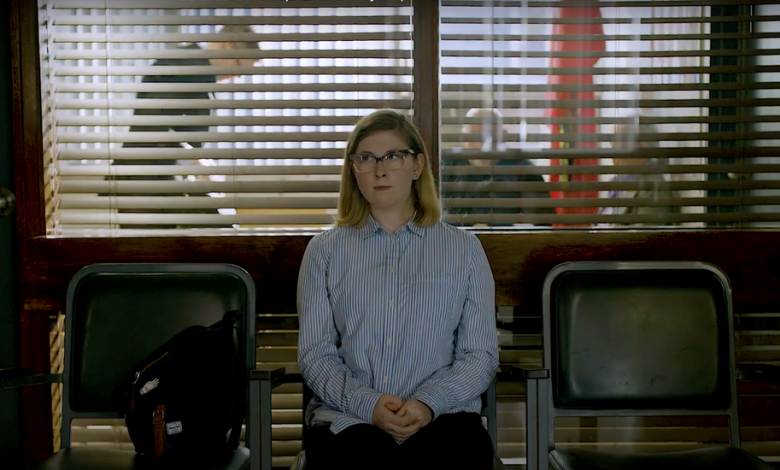Five International Movies to Stream Now

‘Retrograde’
Stream it on Tubi.
The first several minutes of Adrian Murray’s cringe comedy take place in a single, uninterrupted shot. Framed from behind, Molly (Molly Reisman), a 20-something woman in Toronto, and her new housemate, wait in a car by the side of the road as a cop issues Molly a ticket for reckless driving. Even as the film eventually moves on to multiple other locations, including Molly’s apartment, her office and her ex-boyfriend’s home, we never truly leave those initial minutes in the car. The incident takes over Molly’s entire life as she becomes increasingly obsessed with fighting the ticket — re-enacting the scenario repeatedly, doing the rounds of traffic court and talking her friends’ and co-workers’ ears off about the wrongs of the system.
As far as plot goes, that is pretty much all there is. Murray builds out a series of quotidian interactions around Molly’s newfound preoccupation, unfolding a witty, minor-key drama about the daily indignities of modern living and the small, often irrational ways in which we try to claw back agency from an indifferent world. Played with a masterful deadpan by Reisman, Molly is touchingly unlikable — not in the showy ways now fashionable in movies about antiheroines, but in the pricklier, everyday ways that women are rarely allowed to be onscreen.
‘Elena Knows’
Stream it on Netflix.
The Argentine acting powerhouse Mercedes Morán is the linchpin of this gutting mother-daughter drama, adapted from a novel of the same name by Claudia Piñeiro. Both the book and the movie unearth myriad complexities within a classic crime premise: Rita (Erica Rivas), the middle-aged daughter of Elena (Morán), is found dead by hanging in the local church. But Elena, who has Parkinson’s disease, is convinced it is a murder, not a suicide, and she embarks on a painstaking quest through Buenos Aires, visiting the police, the church, Rita’s workplace and the home of Rita’s childhood friend to seek answers.
The whodunit framework eventually emerges as a red herring; there are revelations to come, but they are not the sort Elena hopes for. Instead, she faces hard, irreconcilable facts about motherhood, femininity and women’s autonomy over their bodies and lives. The movie, directed by Anahí Berneri, reifies these themes beautifully in the cinematography, using claustrophobic close-ups and elliptical edits to approximate Elena’s resolve in the face of her illness, as well as the limitations of her often arrogant perspective. Morán, for her part, stuns with a tightly wound performance of embodiment: When Elena’s long-repressed tears finally flow at the end, you may find that you’ve been holding your breath the whole time, too.
‘Rehana’
Rent or buy it on Amazon.
The heroine of this taut Bangladeshi drama by Abdullah Mohammed Saad is difficult to pin down from the very start. When we meet Rehana (Azmeri Haque Badhon), she is berating her brother over the phone; soon after, as she’s proctoring an exam at the medical school where she teaches, she expels a student rather cruelly for trying to cheat. But her severity is also a sign of her integrity. Later that day, Rehana sees a student emerge from a professor’s office, looking distraught. When she learns of the professor’s abuse behind closed doors, she embarks on a furious crusade to have him punished — despite the censure of the administration and the protestations of the terrified victim.
As the students, the perpetrator’s wife and even Rehana’s young daughter all become embroiled in the ensuing crisis, “Rehana” lays bare difficult questions. As a bystander, is Rehana’s responsibility only to the victim of the assault, or also to the many others the man may harm if he goes unpunished? And what is the price worth paying for justice? Is her career, and her daughter’s education, an acceptable cost? Composed of tight indoor shots and a bleak, blue-gray palette, the film brings to life a suffocating world where a courageous woman’s choice is between sacrifice and selfishness.
‘The Mountains Are a Dream That Call to Me’
Stream it on the Criterion Channel.
A verdant forest fills the screen, crowded with vivid green trees. Something stirs in their midst; a silhouette becomes visible. Is it a plant, a person in camouflage, or a ghost? “The Mountains Are a Dream That Call to Me” is a movie full of such subtle shifts, perceptible only to the attentive eye. Composed of moods and landscapes, Cedric Cheung-Lau’s feature unfolds as a simple yet expansive tale about two hikers through the Himalayas — a Nepali man, Tukten (Sanjay Lama Dong), on his way to a new job, and an Australian woman, Hannah (Alice Cummins), grieving some unspoken loss.
An extended shot of light moving across rugged terrain cuts to a close-up of Tukten’s crinkled face as he awakens in the morning glow; a long scene of Hannah stripping in a dimly lit bedroom is followed by an image of a peak glistening in the moonlight against a dark sky. The rumbling of winds thickens the silence of these shots. There’s little dialogue, no discernible story, no neat beginning or end: just a portrait of the smallness of humans against the monumentality of nature.
‘Robe of Gems’
Rent or buy it on Amazon.
The entwined stories of three women, all victims of misogyny in Mexico, unfurl slowly in Natalia López Gallardo’s sinister, cryptic drama. Isabel (Nailea Norvind) is a wealthy, white, blond woman moving into her mother’s grand, rural house with her family, and grappling with marital trouble with her husband. Her longtime maid, María (Antonia Olivares), is looking for her kidnapped sister, one of the many women gone missing amid the drug and gang violence in Mexico. And La Torta (Aida Roa), a local cop, tries futilely to keep her teenage son in check as he sinks deeper into the cartel world.
In a bravura opening shot, a luminous forest comes slowly into view, and we see a man snipping at the scrub, though the sounds we hear are incongruous — a woman’s moans. A reversal in perspective reveals that we’ve been looking out from Natalia’s point of view as she’s pressed up against the glass wall of her new house by her husband, in a sexual act that soon turns to silent, unexplained violence. Throughout, “Robe of Gems” employs such canny shifts in perspective and tricks of sound. If the narrative can feel obscure or difficult to follow, it’s because the movie palpably renders the fog of fear, menace, desperation and inequity that embroils these women, rendering their lives illegible even to themselves.




